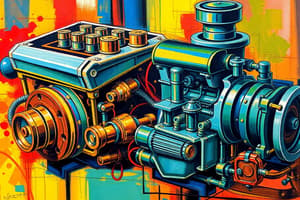Podcast
Questions and Answers
What is the primary difference in the combustion process between a diesel engine and a gasoline engine?
What is the primary difference in the combustion process between a diesel engine and a gasoline engine?
- Diesel engines rely on spark plugs to ignite fuel.
- Gasoline engines are designed to burn fuel at lower temperatures.
- Diesel engines use higher compression ratios to ignite fuel without a spark. (correct)
- Gasoline engines compress air and fuel mixtures at high pressures.
Which component of a diesel engine is primarily responsible for injecting fuel into the combustion chamber?
Which component of a diesel engine is primarily responsible for injecting fuel into the combustion chamber?
- Piston
- Fuel injector (correct)
- Exhaust manifold
- Turbocharger
Why are diesel engines generally considered to be more fuel-efficient than gasoline engines?
Why are diesel engines generally considered to be more fuel-efficient than gasoline engines?
- Diesel engines require less maintenance compared to gasoline engines.
- The combustion process in diesel engines extracts more energy from fuel. (correct)
- Diesel engines operate at lower temperatures.
- Diesel fuel has a lower energy density than gasoline.
What is a common application of diesel engines in various industries?
What is a common application of diesel engines in various industries?
What is one of the main environmental concerns associated with diesel engines?
What is one of the main environmental concerns associated with diesel engines?
Flashcards are hidden until you start studying
Study Notes
Diesel vs. Gasoline Engines
- Diesel engines utilize compression ignition, while gasoline engines use spark ignition to initiate combustion.
- Diesel fuel has a higher energy density than gasoline, contributing to fuel efficiency differences.
Combustion Process in Diesel Engines
- Air is compressed in the cylinder to a high pressure and temperature, igniting the diesel fuel upon injection.
- Combustion occurs over a longer duration, leading to more complete fuel burning and increased efficiency.
Main Components of a Diesel Engine
- Fuel Injector: Atomizes and injects diesel fuel into the combustion chamber at high pressure.
- Piston: Moves in the cylinder to compress air and drive the crankshaft.
- Cylinder: Houses the piston and is where combustion takes place.
- Crankshaft: Converts linear motion of the pistons into rotational motion to power the vehicle.
- Turbocharger: Increases engine efficiency by forcing more air into the combustion chamber, improving power and fuel economy.
Fuel Efficiency of Diesel Engines
- Diesel engines have a higher thermal efficiency due to their higher compression ratios compared to gasoline engines.
- The energy content of diesel fuel contributes to longer driving ranges and less frequent refueling.
Common Applications of Diesel Engines
- Heavy-duty vehicles such as trucks and buses.
- Construction equipment like bulldozers and excavators.
- Marine vessels, including cargo ships and ferries.
- Generators for standby power and off-grid electricity supply.
Environmental Concerns with Diesel Engines
- Diesel engines emit nitrogen oxides (NOx) and particulate matter (PM), contributing to air pollution and health issues.
- Stricter emissions regulations and advancements in technology aim to reduce harmful emissions, including the use of selective catalytic reduction (SCR) and diesel particulate filters (DPF).
- Transitioning to biodiesel and other renewable fuels offers an alternative to mitigate environmental impacts.
Studying That Suits You
Use AI to generate personalized quizzes and flashcards to suit your learning preferences.




